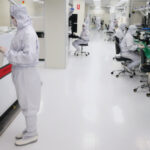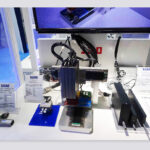ASIA ELECTRONICS INDUSTRYYOUR WINDOW TO SMART MANUFACTURING
More Japan Manufacturers Switch to Renewable Energy
Electronics and electrical equipment manufacturers in Kyoto have been accelerating to switch to renewable energy, taking the lead in the industry.
To illustrate, Murata Manufacturing Co., Ltd. has already switched to renewable energy-derived electricity for the company’s needs at its two production bases and a research facility in Japan and another production base overseas. Furthermore, since 2020, ROHM Co., Ltd. has also fully employed 100 percent renewable energy at its factory building for silicon carbide (SiC) power devices production. In FY2021, the company’s SiC wafer plant in Germany, and offices in Kyoto and Shin-Yokohama, started operating on 100 percent renewable energy.
ROHM’s Thai plant will also use renewable energy this fiscal year.
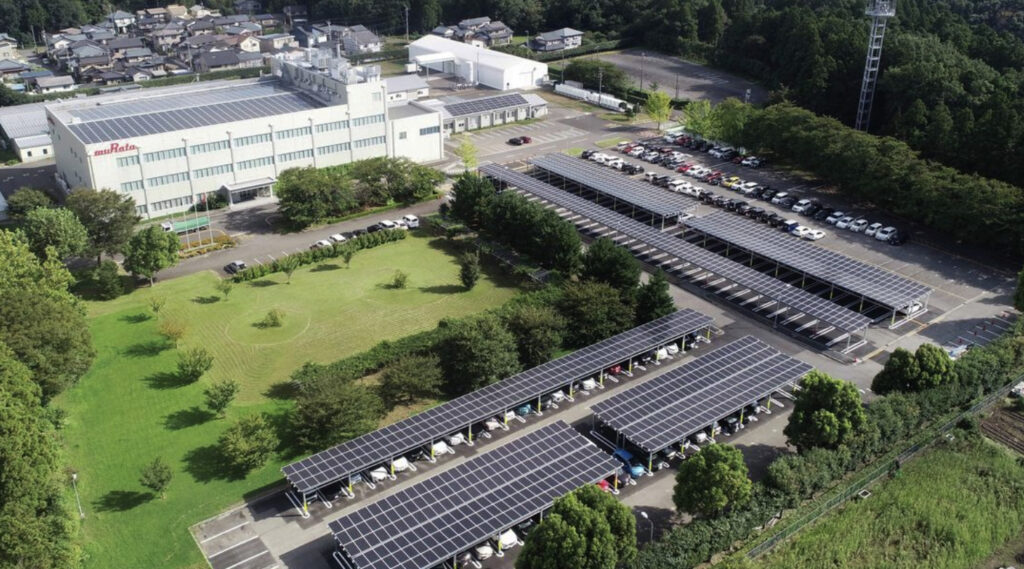
Meanwhile, TOWA Corporation has been using renewal energy for its electricity use in its three bases in Japan since July 2021. Kyoto-headquartered YUSHIN PRECISION EQUIPMENT CO., LTD. plans to switch electricity used at its headquarters, factory, and sales and satellite offices in Japan to renewable energy-derived electricity in April and May.
Kyoto-based manufacturers also join the 100 percent Renewable Electricity (RE100) global environmental initiative that aims to switch electricity used for business activities to 100 renewable energy one after another. They make haste to achieve a sustainable carbon-free society.
Largest Storage Battery System
In Nov. 2021, Murata Manufacturing made Kanazu Murata Manufacturing Co., Ltd. in Awara, Fukui, to become the group’s first plant to operate on 100 percent renewable energy. The plant installed large-scale solar systems on the roofs of the parking lot and the factory building. In addition, it also has a storage battery system, the largest in the Hokuriku region, on its premises.
It is currently the model plant of the Murata Group. In January, Murata made its plant in Batangas Province in the Philippines to become the group’s first overseas plant to operate on 100 percent renewable energy. In March, the company’s Murata Works Minato Mirai Innovation Center also switched to renewable energy-derived electricity. The center is the largest research base in Japan’s Kanto region. Sendai Murata Manufacturing Co., Ltd. followed in April.
Also, in March, Murata entered a contract with Chugoku Electric to procure green energy through photovoltaic power generation systems. The company eyes consumption of renewable energy-derived electricity by the group’s production sites in the Chugoku region to 50 percent by FY2030. Murata joined RE100 in December 2020. The company has been advancing the switch over to 100 percent renewable energy use at its facilities in Japan and overseas. Particularly, it targets to achieve the group’s management goals of using 100 percent renewable energy in the group’s business activities by FY2050.
Done in Stages
ROHM Co., Ltd. started in FY2019 the introduction of renewable energy at ROHM Apollo’s Chikugo plant in Chikugo, Fukuoka Prefecture, Japan. Since then, the company has increased the amount of renewable energy in stages.
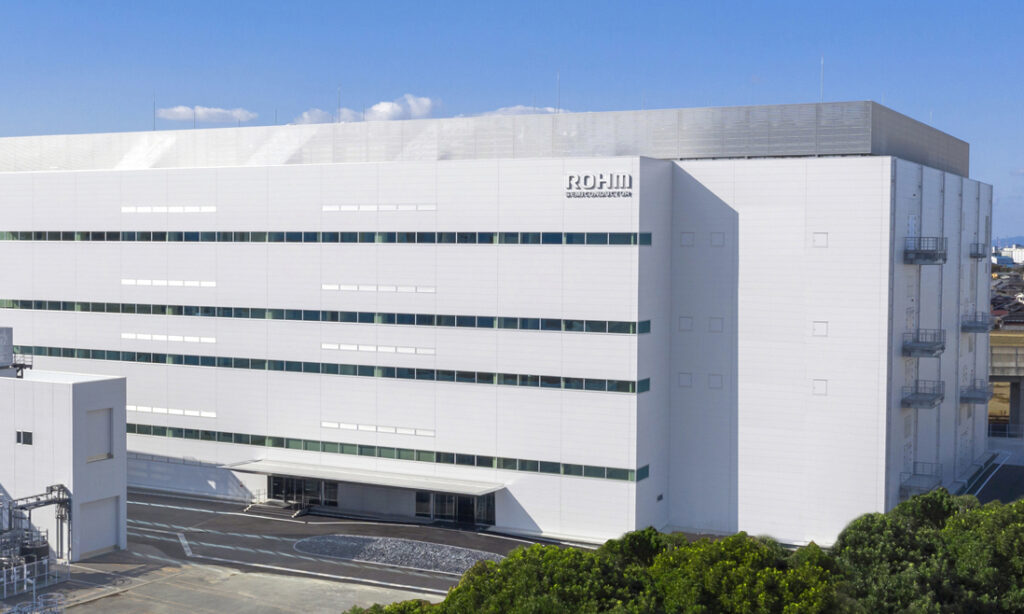
The new building for SiC power devices production has been operating as an environment-friendly plant. One hundred percent of its electricity comes from renewable energy sources. In FY2021, the headquarter plant of SiCrystal GmbH in Germany, which manufacturers SiC wafers, started operating on 100 percent renewable energy. Simultaneously, its offices in front of Kyoto Station and Shin-Yokohama Station also started operating on 100 percent renewable energy.
Starting FY2022, ROHM will operate its Thai Plant in Nava Nakorn, Pathumthani Province on 100 percent renewable energy. From FY2023, ROHM will continue promoting the switchover to renewable energy for electricity at its production sites in Japan and abroad. ROHM has joined RE100, and targets to achieve renewable energy introduction rate of 65 percent in FY2030 and 100 percent in FY2050 for electricity used for its business operations.
Solar Panels on Plants’ Roofs
Since July 2021, TOWA Corporation has been sourcing 100 percent of electricity demand for all of its factories in Japan from renewable energy sources. Besides, its factories use about 12,000MWh annually. These include their headquarters and factory in Minami-ku, Kyoto; Kyoto East Plant in Ujitawara-cho, Tsuzuki-gun, Kyoto Prefecture; and Kyushu Work in Tosu, Saga Prefecture. TOWA expects the reduction of about 4,000 tons of carbon dioxide (CO2) emissions annually.
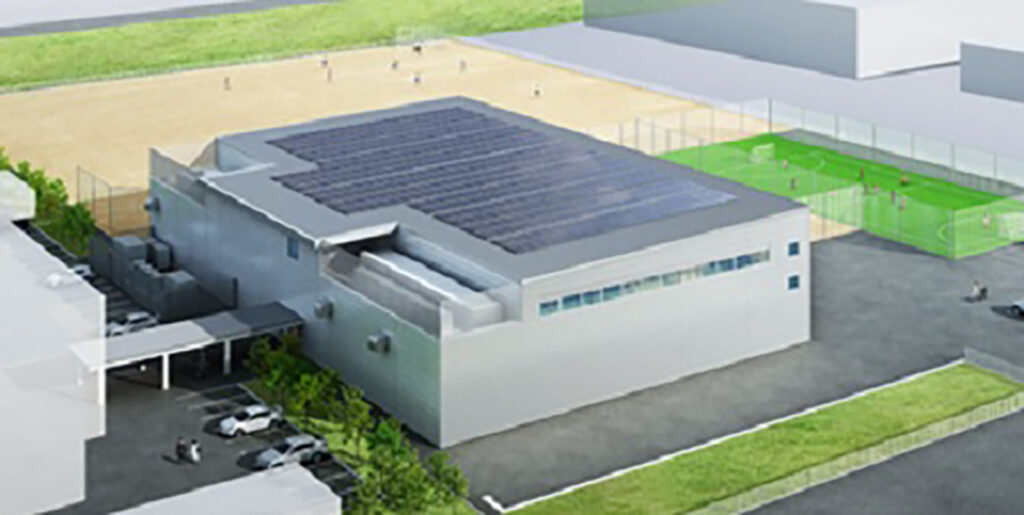
In March, TOWA completed a new building on the premises of Kyoto East Plant. It employs solar panels with annual power generation of 183,673kWh. Moreover, the new building manufactures cutting tools for metal processing, coating treatment, and final inspections of precision molds for semiconductor encapsulation systems. Additionally, installation of solar panels with annual power generation of 336,719kWh on the roof of the existing building is currently underway.
With both buildings combined, about 9 percent of electricity consumed at Kyoto East Plant will come from solar power. Accordingly, the company have also installed solar panels with annual power generation of 2,080,000kWh at its plant in Batu Kawan Industrial Park, in Penang, Malaysia, and solar panels with 1,300,000kWh at its plant in Suzhou, China. As seen, the company has been advancing the transition to green power.
From Iwate to Ohita
Effective April 1, YUSHIN PRECISION EQUIPMENT CO., LTD. switched electricity used at its headquarters and factory, and Technical Center in Minami-ku, Kyoto, and Fushimi Plant in Fushimi-ku, Kyoto to 100 percent renewable energy. By May, the company will also switch to 100 renewable energy all sales and satellite offices directly contracted with power supply companies across Iwate Satellite Office and Tohoku Sales Office in the north to Fukuoka Sales Office and Ohita Satellite Office in the south. Nishi-Nihon General Sales Office will be an exception.
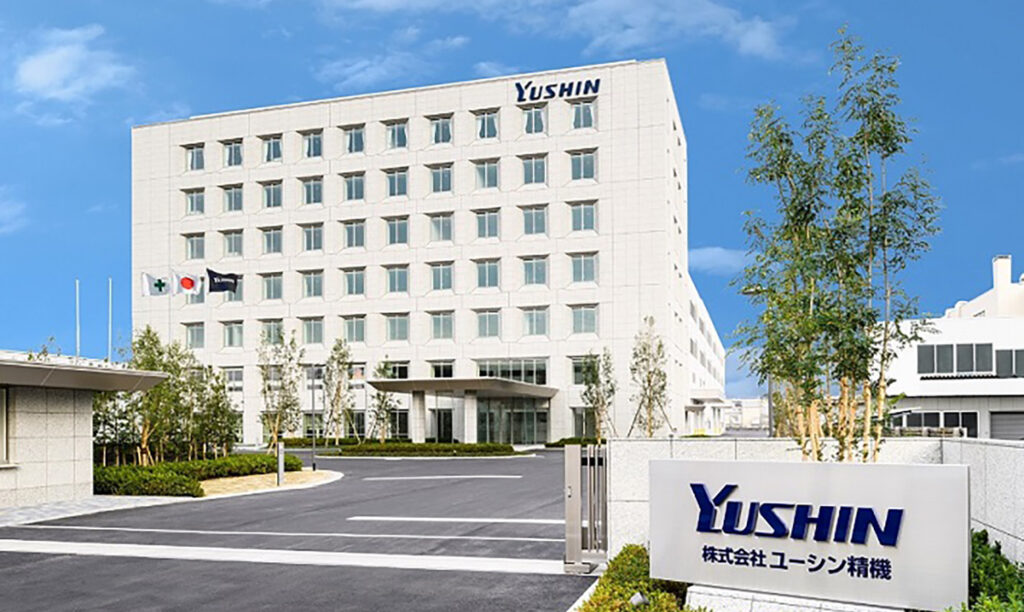
These offices consume about 2,000,000kWh of electricity annually. YUSHIN estimates that the switching can reduce about 740 tons of CO2 emissions in FY2022.



